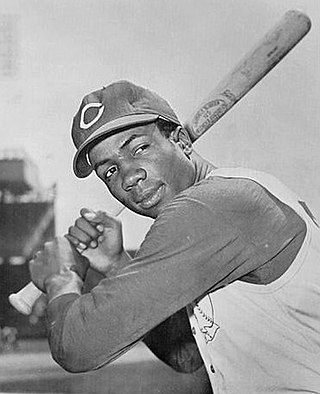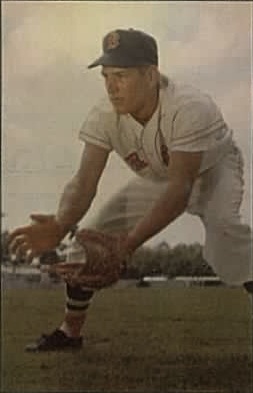
Frank Robinson, nicknamed "The Judge", was an American professional baseball outfielder and manager in Major League Baseball (MLB) who played for five teams over 21 seasons: the Cincinnati Reds (1956–1965), Baltimore Orioles (1966–1971), Los Angeles Dodgers (1972), California Angels (1973–1974), and Cleveland Indians (1974–1976). In 1975, Robinson became the first Black manager in big-league history, as the player-manager of the Indians.

William Dale Goodman was an American Major League Baseball (MLB) infielder who played 16 seasons for the Boston Red Sox, Baltimore Orioles, Chicago White Sox, and Houston Colt .45s, from 1947 through 1962. Goodman was inducted posthumously into the Boston Red Sox Hall of Fame in November 2004.
The second Negro National League was one of the several Negro leagues that were established during the period in the United States when organized baseball was segregated. The league was founded in 1933 by businessman Gus Greenlee of Pittsburgh.

Paul Howard "Dizzy" Trout was an American professional baseball player. He played in Major League Baseball as a right-handed pitcher from 1939 to 1952, most notably as a member of the Detroit Tigers team that finished either in first or second place in the American League pennant races between 1944 and 1947 and won the 1945 World Series. The two-time All-Star player was the American League wins leader in 1943 and, was the league ERA leader in 1944. In 1957, Trout made a brief comeback attempt at the age of 42 with the Baltimore Orioles. He also played for the Boston Red Sox.

Terrence Michael Crowley is an American former professional baseball player and coach. He played in Major League Baseball as an outfielder, first baseman and pinch hitter from 1969 through 1983, most notably as a member of the Baltimore Orioles dynasty that won three consecutive American League pennants from 1969 to 1971 and, won the World Series in 1970. He serves as an organizational hitting instructor for the Baltimore Orioles. Crowley has been inducted into the Staten Island Sports Hall of Fame.

Donald Roy Johnson was an American Major League Baseball pitcher. The 6 ft 3 in (1.91 m), 200 lb (91 kg) right-hander was signed by the New York Yankees before the 1944 season and played for the Yankees, St. Louis Browns (1950–51), Washington Senators (1951–52), Chicago White Sox (1954), Baltimore Orioles (1955), and San Francisco Giants (1958).
The 1947 BAA draft was the 1st draft of the Basketball Association of America (BAA), which later merged with the National Basketball League (NBL) to become the National Basketball Association (NBA). The fledgling BAA held a joint draft with the established NBL. Both leagues wanted to control salaries by stamping out competitive bidding by assigning exclusive rights to the team selecting a player. The NBL had already signed 11 players, whom they did not feel should be exposed to the draft. The players included college stars Jack Smiley, Ralph Hamilton, Harry Boykoff, John Hargis, Frank Brian, and Charlie Black. As a trade-off, the BAA teams were allowed to select players before the NBL.
The 1994 Baltimore Orioles season was the 94th season in Baltimore Orioles franchise history, the 41st in Baltimore, and the 3rd at Oriole Park at Camden Yards. It involved the Orioles finishing second in the American League East with a record of 63 wins and 49 losses. The season was cut short by the infamous 1994 player's strike.
The 1990 Baltimore Orioles season was a season in American baseball in which the Orioles finished fifth in the American League East with a record of 76 wins and 85 losses.
The 1985 Baltimore Orioles season was a season in American baseball. It involved the Orioles finishing fourth in the American League East with a record of 83 wins and 78 losses. The Orioles led Major League Baseball in home runs (214) and slugging percentage (.430).

The 1983 Baltimore Orioles won the Major League Baseball World Series after finishing first in the American League East with a record of 98 wins and 64 losses, The Orioles won the championship by beating the Philadelphia Philles, 4–1, in the 1983 World Series. The season was the Orioles' first in nearly 15 years without manager Earl Weaver, who retired after the Orioles missed the playoffs in the final game of the 1982 season. The Orioles replaced the future Hall of Famer Weaver with Joe Altobelli. The World Series victory was the Orioles' first championship since 1970 and their most recent to date.
The 1961 Baltimore Orioles season involved the Orioles finishing third in the American League with a record of 95 wins and 67 losses, 14 games behind the AL and World Series champion New York Yankees. The team was managed by Paul Richards and Lum Harris, and played their home games at Baltimore's Memorial Stadium.
The 1954 Baltimore Orioles season saw the restoration of Major League Baseball to Baltimore after a 51-year absence, and the debut of the modern edition of the MLB Oriole franchise. Upon the transfer of the moribund St. Louis Browns on September 30, 1953, Baltimore returned to the American League over a half century after the Orioles of 1901–02 departed for New York City, where they eventually became the Yankees. The Baltimore Terrapins of the "outlaw" Federal League filled the void in 1914 and 1915, but the insurgent circuit collapsed without gaining recognition as a "third major league," and, as of 2022, its status remained in dispute. During most of its 51 seasons without a major-league team, Baltimore was represented in Organized Baseball by a top-level minor-league club, the Orioles of the International League.
The 1950 major league baseball season began on April 18, 1950. The regular season ended on October 1, with the Philadelphia Phillies and New York Yankees as the regular season champions of the National League and American League, respectively. The postseason began with Game 1 of the 47th World Series on October 4 and ended with Game 4 on October 7. The Yankees swept the Phillies in four games, capturing the 13th championship in franchise history.
Frank Bernard "Beauty" McGowan was an American professional baseball player, an outfielder who appeared in 375 games over five seasons in Major League Baseball for the Philadelphia Athletics, St. Louis Browns and Boston Bees. The native of Branford, Connecticut, threw right-handed, batted left-handed, stood 5 feet 11 inches (1.80 m) and weighed 190 pounds (86 kg).
The 1947–48 New York Knicks season was the second season for the team in the Basketball Association of America (BAA), which later merged with the National Basketball League to become the National Basketball Association. The Knicks finished in second place in the Eastern Division with a 26–22 record and qualified for the BAA Playoffs. In the first round, New York was eliminated by the Baltimore Bullets in a best-of-three series, two games to one. Carl Braun was the team's scoring leader during the season.

Raoul Robert "Ralph" LaPointe was a professional baseball player. In a playing career that spanned eight teams, ten years, and seven seasons, LaPointe played for the Philadelphia Phillies of Major League Baseball in 1947, and the St. Louis Cardinals in 1948. He was officially listed as standing 5 feet 11 inches (180 cm) and weighing 185 pounds (84 kg).






